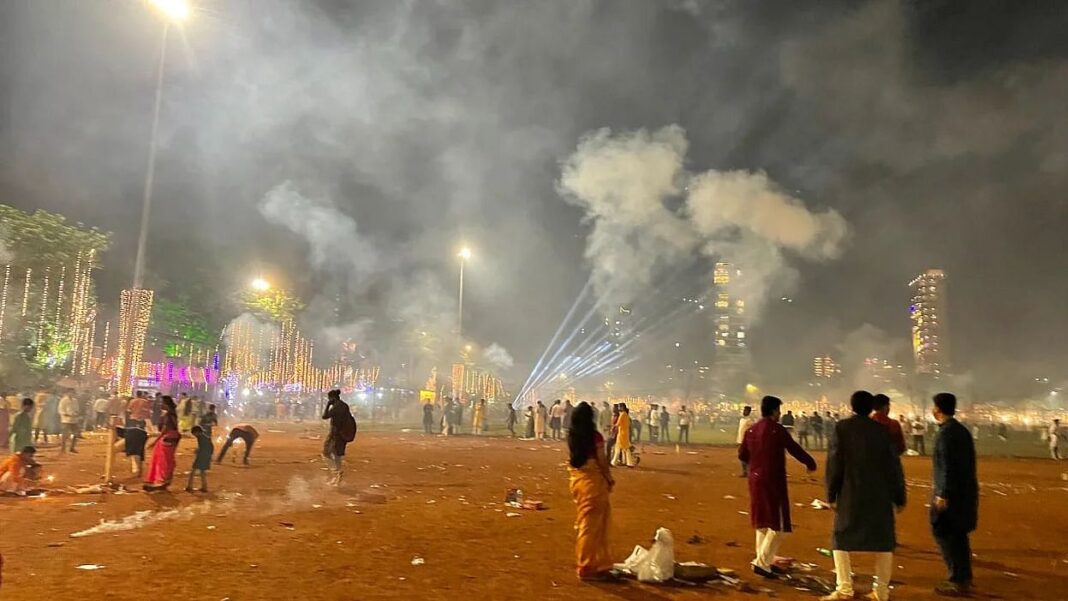Mumbai: City doctors have been reporting a considerable surge in the number of patients suffering from severe respiratory disorders during and after the post-Diwali festival. The list of ailments very frequently includes asthma and Coronary Obstructive Pulmonary Disease (COPD), which are directly associated with exposure to polluted and toxic air. Thane: Air quality during Diwali worst in three yearsBesides, people with a history of COVID are at an increased risk of developing respiratory problems, as COVID is known to have long-lasting, adverse effects on the lungs.
Considering the surge of cases, doctors have urged citizens to visit the nearest hospital or clinic for consultation if they have any symptoms related to respiratory illnesses. Dr Radhika Banka, Consultant Pulmonologist at P. D.
Hinduja Hospital and MRC, said there is always an increase in respiratory illnesses in this season due to the pollution secondary to Diwali celebrations. In addition, erratic rains this season have added to the woes of patients with respiratory illnesses. “We are seeing a lot of non-covid viral infections and particularly we had a patient who presented to us with cough and fever and drops in oxygen saturations with a CT scan showing bilateral pneumonia and a throat swab confirmed influenza.
He was treated with anti-virals and soon improved. The elderly and the immunosuppressed population need to get vaccinated with the flu vaccine, avoid large gatherings and stay away from indoor and outdoor pollution due to Diwali. I have been advising my patients with chronic respiratory illnesses to go outstation if possible, to avoid any worsening of their illness due to the increased pollution,” she said.
Moreover a study suggests that India witnesses a whopping 30%–40% increase in the cases of wheezing, respiratory infections, exacerbation of bronchial asthma, and chronic obstructive pulmonary disease (COPD) in and around Diwali festival. “An increase has been marked in the number of patients who need hospitalisation and suffer from severe respiratory and cardiovascular diseases. I have been seeing 5 to 6 patients daily complaint breathlessness.
Before Diwali, they all were living a normal life, but the sudden rise in stubble burning cases followed by Diwali pollution aggravated their problems,” said a doctor. Dr Mala Kaneria, Consultant of Infectious Diseases, at Jaslok Hospital & Research Centre said the festival of lights brings its share of medical ailments each year and persons suffering from asthma, bronchitis, and other respiratory ailments are especially at risk. This year, with the resumption of celebrations, post-pandemic, Diwali was particularly noisy.
Even though green crackers have been recommended by the government, the Air quality index in the city has dipped into the very poor category. “There is a rise in cases of bronchial asthma and exacerbation of other respiratory ailments like chronic obstructive pulmonary disease, bronchitis, etc. Besides, people with a history of COVID are at an increased risk of developing respiratory problems because, COVID is known to have long-lasting, adverse effects on the lungs.
Also, with the advent of new COVID subvariants, there may be a rise in infections in people with underlying lung conditions, especially with the onset of winter,” she said. Dr Viswesvaran Balasubramanian, Consultant Interventional Pulmonology and Sleep Medicine said asthmatics are more prone to develop worsening breathlessness and respiratory tract infections during and following Diwali due to increase indoor and outdoor air pollution. It has been observed that fire crackers produce extremely high levels of particulate matter 2.
5 (PM2. 5) over a short period of time and burning of fire crackers during Diwali festival may worsen the underlying asthma control. “Patients with asthmatics are advised to continue their prescribed inhalers properly and are expected to wear protective masks and stay indoors to avoid acute exposure to pollutants during time of Diwali.
In addition if a patient with asthma develops worsening breathlessness, they should watch for danger signs like breathlessness, wheeze or cough not controlled with prescribed rescue medications , onset of new fever or atypical chest pain. If they notice any of these symptoms then they should report to their doctor early,” he said. .
From: freepressjournal
URL: https://www.freepressjournal.in/mumbai/mumbai-cases-of-respiratory-illnesses-and-asthma-increase-post-diwali



